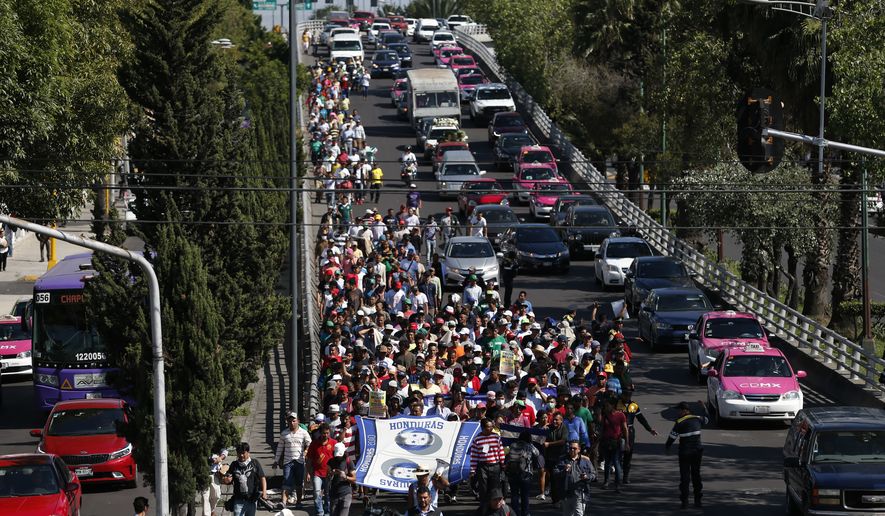The administration announced a new policy Thursday giving President Trump power to block asylum claims from the migrant caravan and other illegal immigrants who plan to jump the U.S.-Mexico border.
Mr. Trump is expected to issue a proclamation Friday flexing his national security powers and triggering the new policy, which will then allow Homeland Security to refuse to accept asylum claims unless people come through official border crossings.
The goal, officials said, is to try to turn the illegal traffic into legal traffic, taking power over who gets admitted to the U.S. away from migrants, and putting it back in the hands of the government.
“Those who enter the country between ports of entry — i.e. illegally — are knowingly and voluntarily breaking the law,” a senior administration official told reporters. “While all immigration laws do afford people various forms of protection, the reality is that it’s a violation of federal law to enter our country in the manner that these illegal aliens are entering the country.”
Immigrant-rights activists vowed to tie the plans up in court, calling them illegal and un-American. They said U.S. law guarantees anyone the right to ask for asylum no matter how they reached the country.
The administration’s move underscores how frustrated Mr. Trump has become over the lack of action in Congress to stem the surge of illegal immigrants posing as asylum seekers.
Meant to be a protection for people fleeing government persecution, the numbers of asylum seekers have ballooned in recent years as they realized it can be used as a shortcut to gain an illegal foothold in the U.S.
More than 60 percent of illegal immigrants caught from Guatemala, Honduras and El Salvador demand asylum, the government said.
While other illegal immigrants nabbed at the border are quickly processed and deported, those who ask for asylum are granted what’s called a “credible fear” hearing. If they expressing a worry about being sent home, they are allowed to stay and apply for asylum.
Authorities say it’s a low bar and migrants are coached on “magic words” they can say to qualify.
Few of them will actually earn asylum — just 17 percent of people who cleared the initial step last year ended up getting asylum — but few actually get deported. Most were already released into the country where they disappear into the shadows with other illegal immigrants.
“It’s a massive, frankly, almost historically unparalleled abuse of our immigration system that is completely and totally overwhelming the immigration system, the asylum system, border security,” the senior official said. “By any definition, it is a full-fledged and very large crisis.”
Under the new policy migrants who show up at official border crossings will be allowed to claim asylum, even if they don’t have permission to enter.
But those who climb the border fence, swim the Rio Grande or walk through undefended territory to sneak into the country would not be allowed to make a claim.
The American Civil Liberties Union called the policy change illegal.
“U.S. law specifically allows individuals to apply for asylum whether or not they are at a port of entry. It is illegal to circumvent that by agency or presidential decree,” said ACLU lawyer Omar Jadwat.
Administration officials said that’s not quite right.
They said the U.S. can’t prevent people from applying for a stay of deportation, but they don’t have to allow asylum claims to be made at any place no matter how someone entered.
The new policy also points to parts of the asylum law giving the attorney general powers to “set conditions or limitations” on how asylum applications can be considered.
It’s not clear, though, that the policy would keep anyone who wants to come from attempting it.
Still, officials said in the 78-page policy document they hope one effect will be to encourage Central American migrants to seek asylum in Mexico, rather than rush for the U.S., the government argued in documents.
Plus, it would be a prod to Mexico and other Latin American countries to join the U.S. in trying to prevent large caravans, the government said.
These sorts of policies usually must go through a full notice-and-comment period, but the administration argued that would be a misstep in this case. For one thing, it could create a rush for migrants hoping to get in under the wire, officials said.
Fears of the latest migrant caravans pervade the 78-page policy.
Thousands of Central Americans are traversing Mexico with an eye to reach the U.S. and to demand asylum.
They’ve rejected offers of asylum in Mexico, and instead have asked the government to provide them with buses or trucks to get to the U.S. border faster.
Most say they are looking to reunite with illegal immigrant family in the U.S. or are fleeing crime and poverty back home, rather than the sort of government-sponsored religious, racial or political persecution that used to make up asylum cases.
The Coalition for Humane Immigrant Rights, a Los Angeles-based organization, said it would deploy a team of lawyers to Mexico City, where one caravan is camped out right now, to advise members on options.
“Our immigration attorneys are part of a humane, compassionate, and concrete response for migrants,” said Luis Perez, legal services director for the group.
President Trump has deployed more than 5,000 active-duty U.S. troops to the American side of the border, where they are hardening the ports of entry with razor wire fencing and working to support Border Patrol agents in the field.
Mexican authorities this week said they had detected and deported six Hondurans from within the caravan who had criminal records for homicide and robbery.
• Stephen Dinan can be reached at sdinan@washingtontimes.com.




Please read our comment policy before commenting.